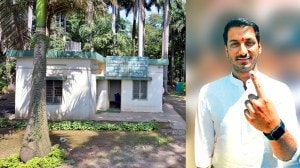Come next week, Delhi’s flagship theatre fest returns with its biggest season ever
The lineup: Naseeruddin Shah, Anupam Kher and Pankaj Kapur
 A still from Naseeruddin Shah's play Einstein, which will open the show at Siri Fort on Friday.
A still from Naseeruddin Shah's play Einstein, which will open the show at Siri Fort on Friday. When it began six years ago, the idea behind the Delhi Theatre Festival (DTF) was both simple and ambitious: could theatre become a mainstream weekend plan? Not a small event at a niche auditorium, perhaps patronised by culturally evolved aficionados, but a big-stage show with star performers who were among the best in the business, and which would attract large audiences who would anticipate and cherish the moment?
As the festival returns for its sixth season from November 14-16, co-founder Prabhu Tony believes the goal of making theatre accessible to larger audiences is no longer aspirational — it’s happening.
“Earlier, plays would happen in a small corner in Kamani Auditorium and only the regulars would know about them. We thought, ‘How can we expose a larger audience to this?’” Tony said.
Tony’s team wanted to create a cultural space in which not just friends and families, but even strangers could bond over the magic of theatre. “We were not creating a standalone play experience. It was to be a melting pot of culture,” he said.
DTF’s lineup this year is its biggest ever — 13 shows will be staged across three days at venues including Siri Fort Auditorium, NCUI Auditorium, O P Jindal Auditorium and Aurum Conventions in Gurgaon.
The show opens at 8 pm on Friday with Einstein at Siri Fort, in which Naseerudin Shah plays the titular role, and Autobiography, directed by Lillete Dubey and featuring Denzel Smith, at NCUI.
November 15 will be a packed day: two more shows of Einstein in the afternoon and evening, and one of Autobiography in the afternoon; plus, in the evening, Makarand Deshpande’s iconic Sir Sir Sarla; Karamjale Brothers, an adaptation of Fyodor Dostoevsky’s Brothers Karamazov, directed by Rajat Kapoor and featuring Vinay Pathak; and Dreamz, featuring Pankaj Kapur.
On November 16, the last day of the festival, there will be a show each of Einstein and Dreamz, and Kuch Bhi Ho Sakta Hai featuring Anupam Kher, and Dhumrapaan, a take on the corporate rat race featuring Kumud Mishra.
2025 will be DTF’s biggest year in terms of talent and scale, Tony said. “If you look at the lineup, this is the biggest season of all. We’ve never got these many people together,” he said.
The festival will see the Delhi premieres of Karamjale Brothers, Autobiography, and the reimagined Dreamz. DTF avoids repetition, the plays do not return for at least three to four years. “We want new genres, new artists, new experiences,” Tony said.
DTF draws 55,000-60,000 people into theatres every year, many of whom are first-time theatre-goers. Tony recalled an occasion when, following an unexpected delay, he apologised to the audience for the inconvenience, and someone responded, “It doesn’t matter. Please keep doing this.”
Such reactions are a reminder of the impact the festival has left, he said. Ticketing apps these days regularly list large-scale theatre productions alongside movies and concerts — “We have been able to start a movement,” Tony said.
Ahead of the sixth edition of DTF, the festival continues to bet on its founding belief: once someone experiences live theatre, they want to keep coming back for more.







